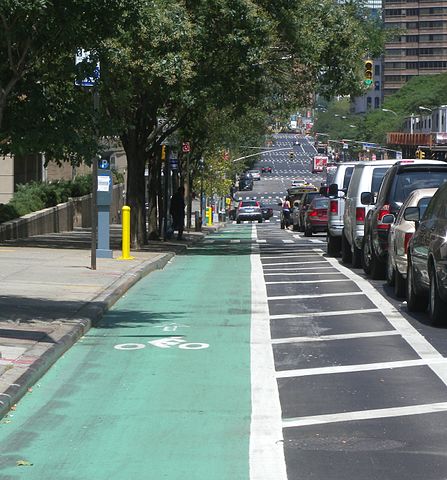Should Boston Overhaul Streets for Bikes?
 Are cycle tracks/protected bike lanes coming to Boston? (Photo via Wikimedia/Jim.henderson)
Are cycle tracks/protected bike lanes coming to Boston? (Photo via Wikimedia/Jim.henderson)
Last Thursday, Boston University student Christopher Weigl was killed due to an accident with a tractor trailer on Commonwealth Ave. It was the fifth traffic-related death of a bicyclist this year, and sadly, occurred on the same day that City Council was holding a public hearing on bike safety.
That public hearing resulted in a commitment from Kris Carter, interim head of the city’s “Boston Bikes” program, to release three years of bike-crash data from the police. Believe it or not, we don’t know why bikers are getting into road accidents in Boston, despite that fact that there were nearly 600 bike-related accidents that required medical services between January 1 and November 13. This new information will allow the Boston Cyclists Union and transportation planners to study the causes of road crashes: Are cars hitting bikes during right turns? Doorings? Bicyclists running red lights? Cars illegally parked in bike lanes?
That data will be incredibly helpful, and it may provide biking advocates with strong evidence that the city needs to make some big changes. As in: Overhauling our current street infrastructure.
So far, Boston has mostly relied on bike lanes, of which we’ve painted 50 new miles over the past few years. Bike lanes are pretty helpful when it comes to safety: As Casey Lyons pointed out in October, a study by the American Journal of Public Health found that bikers using bike lanes are 50 percent less likely to have a hospital-worthy injury. But bike lanes, as city councilor Felix Arroyo told NECN, are really just paint on the street.
The best way to curtail injuries would be placing “cycle tracks,” which are physically separated, bike-only paths, on major streets like Commonwealth Ave. Cycle tracks protect bikers from the main flow of traffic, and were found by that same American Journal of Public Health study to reduce injuries by a stunning 90 percent.
Of course, construction of cycle tracks would require the removal of either traffic lanes or parking, which would spark a major political fight from drivers. Still, they have some powerful advocates, including Arroyo and City Councilwoman Ayanna Pressley, who told Back Bay Patch last week that she’d like to learn more about the option: “I would like to explore measures to increase the safety of bicycle riders while simultaneously limiting the negative impacts on parking and traffic. Specifically, I want to discuss the feasibility of real infrastructure improvements, such as bike lane barriers.”
Granted: We can’t build cycle tracks everywhere. But a select few, on streets like Commonwealth Ave, would go a long way to cutting down on injuries—and deaths.


